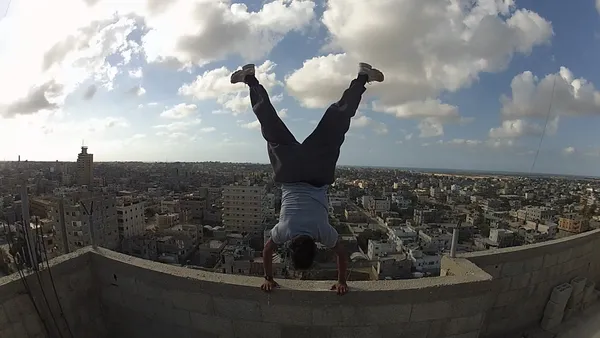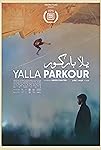Eye For Film >> Movies >> Yalla Parkour (2025) Film Review
Yalla Parkour
Reviewed by: Amber Wilkinson

Framed by the personal memories of US-based director Areeb Zuaiter, who is recalling her mother’s life and move away from the West Bank, where the filmmaker was born, Yalla Parkour is given an anchor in the present by her growing friendship over Messenger with young athlete Ahmed Matar, whose clips of his parkour achievements she came across online.
Shot over a 10-year-period the film begins with Matar living in Gaza, spending most of his free time trying to perfect his flips and acts of daring with his friends, frequently on the shells of buildings - a reminder of the continual presence of conflict in the region. “This day was great, we went to the bombed mall,” Matar enthuses, the destruction so normalised he doesn’t dwell on it. That washing lines can also often be seen hanging from the structures is also a damning indication of just how embedded within ordinary life the violence has become.

Matar and his friends are, on the whole, very good at their sport - although we are introduced to one member of the crew who is not so lucky - but it is presented in a matter-of-fact fashion. While the youngsters’ skill is evident and admired by the filmmaker, her conversations with Matar indicate that the kids see it as a means to an end - namely a potential ticket out of Gaza. While she doesn’t spell it out, there’s a sense that exerting control over their risk taking like this is also a response to an occupation that leaves them with few options.
While not overtly political, Yalla parkour also captures the Kafkaesque situation Matar finds himself in when he does get a visa to travel abroad. As he waits, along with many others, for the border to potentially open, he notes: “If I don’t get through within a month, it will have expired.”
Matar’s desire to leave adds a tension of sorts to the film, since Zuaiter, in contrast, is on the outside of the place, looking back with nostalgia and ruminating on the fact that her mother’s displacement took some of her happiness with it. The passage of time brings movement and challenges as gaining a new life also means leaving behind an old one with everything that it contained. More on what happens to Matar during the final period when Zuaiter is following him would be welcome, as this feels rather rushed compared to what has gone before - although perhaps it is an inevitable consequence that as he has aged and taken on adult responsibilities, he has less time to chat. A thoughtful consideration of not just physical prowess but the emotional agility and resilience demonstrated by those growing up in Gaza.
The film, which won the international award at DOC NYC and screens at the Berlinale this week, stands in the shadow of more recent events, highlighted by in memoriam tributes that appear during the end credits.
Reviewed on: 16 Feb 2025

















